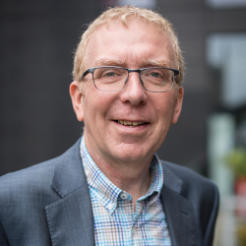![]()
Navca’s chief executive Neil Cleeveley tells Kirsty Weakley that local infrastructure bodies need to collaborate, argue for early intervention, and explain the contribution they make.
Neil Cleeveley’s first months as chief executive of Navca, the membership body for local support and development charities, have been eventful.
After joining Navca as director of policy in 2003, Cleeveley was permanently appointed as chief executive in November 2014, following Joe Irvin’s departure last year.
Since then he has developed a new strategy for his organisation, which is coping with falling income and is expected to make four redundancies, and is now carrying out a programme of work around the recommendations of the findings of the Commission for Local Infrastructure, a panel of experts set up by Navca to examine the state of the sector it serves.
The Commission published its final report, Change for Good, in January. It called for infrastructure bodies to be “redesigned and creatively resourced”.
The future of local infrastructure
The infrastructure sector is currently a “patchwork” of strong, well-resourced areas and weaker areas with fewer resources, Cleeveley says. He believes the sector needs to think about how effectively its infrastructure operates.
“I think the priority for us has got to be how we focus resources on those who most need them.” he says.
Navca is planning a series of events around the country, in partnership with NCVO, to encourage infrastructure bodies to come together and think about infrastructure in their area.
He wants to encourage “sensible conversations between funders, public bodies, and infrastructure bodies” about how to support local voluntary organisations, and how to grow community engagement and involvement.
“I think Change for Good demonstrates the important role local charity plays in society,” he says. “We need to make sure that is recognised and that something is done about it to make sure it is sustainable over the longer term.”
Cleeveley dismisses the suggestion that the infrastructure sector needs radical change, but says it needs to think carefully about the “big challenge” of why it exists and whether it is correctly run.
“It’s dangerous to think about wholesale change because you end up throwing out much of which is good,” he says. “But I do think that there needs to be some serious thought, and perhaps some radical thought, about how infrastructure is organised.
“We need to ask ourselves ‘why are we here?’ And this does not just apply to infrastructure organisations, but to the whole voluntary sector.”
This kind of structural change will not take place overnight, he warns.









